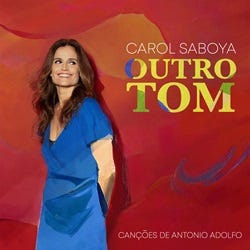Carol Saboya - Outro Tom - Canções de Antonio Adolfo
(AAM Music, 2024)
Among Brazil’s many treasures and charms, few or none are so admired and popular as Rio de Janeiro vocalist Carol Saboya and her father, noted composer Antonio Adolfo. The daughter honors the father and his 60-year career with Outro Tom - Canções de Antonio Adolfo (Another Tone - Songs by Antonio Adolfo). Saboya celebrates her own 25-year métier, having yielded 14 recordings, including her well received Lá E Cá Here And There (AAM, 2010), Belezas (AAM, 2012), Copa Village (AAM, 2015) and Carolina (AAM, 2016).
Saboya naturally had access to her father's catalog. Taking advantage of this, she took the songs to the piano, studying each against the original scores, acquainting herself with the lyrics, harmonies, and melodies intimately, allowing her to find her approach to the music. Her time in the woodshed paid off. Sharpening her chops, Saboya plays piano on half of the 10 selections. Rather than cherry pick selections from throughout her father’s career, Saboya concentrated on a sliver, focusing on the period between 1972 and 1980, when Adolfo divorced himself from the mainstream industry to focus on the craft of music making, becoming a pioneer of the Brazilian independent market.
Saboya’s performance on Outro Tom is a departure from her previous, more Bossa-centered recordings. She adopts a lightly held approach that is more pop oriented and more characteristic of the period from which this material was collected. Saboya attempted the tricky alchemy of retaining the salient elements of the late 1970s, while still infusing a bright contemporary character. This approach manifests in "Alegria de Carnaval." Saboya patterned her version on her father’s recording Viralata (Artezanal, 1979). Thus, we have the provocative juxtaposition of Adolfo’s piano and the brass section from 1979, against Saboya’s and her daughters' (Amanda and Joana) 2024 performances. The result is a shimmering holography transcending space and time, with love and family at the center.



